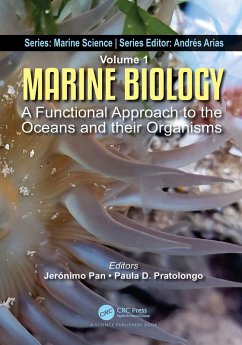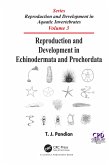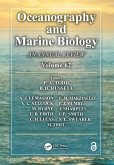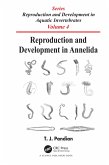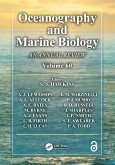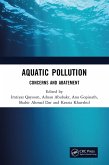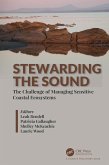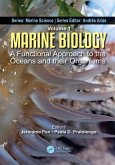Marine Biology (eBook, ePUB)
A Functional Approach to the Oceans and their Organisms
Redaktion: Pan, Jerónimo; Pratolongo, Paula
70,95 €
70,95 €
inkl. MwSt.
Sofort per Download lieferbar

35 °P sammeln
70,95 €
Als Download kaufen

70,95 €
inkl. MwSt.
Sofort per Download lieferbar

35 °P sammeln
Jetzt verschenken
Alle Infos zum eBook verschenken
70,95 €
inkl. MwSt.
Sofort per Download lieferbar
Alle Infos zum eBook verschenken

35 °P sammeln
Marine Biology (eBook, ePUB)
A Functional Approach to the Oceans and their Organisms
Redaktion: Pan, Jerónimo; Pratolongo, Paula
- Format: ePub
- Merkliste
- Auf die Merkliste
- Bewerten Bewerten
- Teilen
- Produkt teilen
- Produkterinnerung
- Produkterinnerung

Bitte loggen Sie sich zunächst in Ihr Kundenkonto ein oder registrieren Sie sich bei
bücher.de, um das eBook-Abo tolino select nutzen zu können.
Hier können Sie sich einloggen
Hier können Sie sich einloggen
Sie sind bereits eingeloggt. Klicken Sie auf 2. tolino select Abo, um fortzufahren.

Bitte loggen Sie sich zunächst in Ihr Kundenkonto ein oder registrieren Sie sich bei bücher.de, um das eBook-Abo tolino select nutzen zu können.
We present you with an updated reference book aimed for upper-level undergraduate and graduate students interested in Marine Biology.
- Geräte: eReader
- mit Kopierschutz
- eBook Hilfe
Andere Kunden interessierten sich auch für
![Reproduction and Development in Echinodermata and Prochordata (eBook, ePUB) Reproduction and Development in Echinodermata and Prochordata (eBook, ePUB)]() T. J. PandianReproduction and Development in Echinodermata and Prochordata (eBook, ePUB)49,95 €
T. J. PandianReproduction and Development in Echinodermata and Prochordata (eBook, ePUB)49,95 €![Oceanography and Marine Biology (eBook, ePUB) Oceanography and Marine Biology (eBook, ePUB)]() Oceanography and Marine Biology (eBook, ePUB)198,95 €
Oceanography and Marine Biology (eBook, ePUB)198,95 €![Reproduction and Development in Annelida (eBook, ePUB) Reproduction and Development in Annelida (eBook, ePUB)]() T. J. PandianReproduction and Development in Annelida (eBook, ePUB)49,95 €
T. J. PandianReproduction and Development in Annelida (eBook, ePUB)49,95 €![Oceanography and Marine Biology (eBook, ePUB) Oceanography and Marine Biology (eBook, ePUB)]() Oceanography and Marine Biology (eBook, ePUB)0,00 €
Oceanography and Marine Biology (eBook, ePUB)0,00 €![Aquatic Pollution (eBook, ePUB) Aquatic Pollution (eBook, ePUB)]() Aquatic Pollution (eBook, ePUB)168,95 €
Aquatic Pollution (eBook, ePUB)168,95 €![Stewarding the Sound (eBook, ePUB) Stewarding the Sound (eBook, ePUB)]() Stewarding the Sound (eBook, ePUB)49,95 €
Stewarding the Sound (eBook, ePUB)49,95 €![Marine Biology (eBook, PDF) Marine Biology (eBook, PDF)]() Marine Biology (eBook, PDF)70,95 €
Marine Biology (eBook, PDF)70,95 €-
-
-
We present you with an updated reference book aimed for upper-level undergraduate and graduate students interested in Marine Biology.
Dieser Download kann aus rechtlichen Gründen nur mit Rechnungsadresse in A, B, BG, CY, CZ, D, DK, EW, E, FIN, F, GR, HR, H, IRL, I, LT, L, LR, M, NL, PL, P, R, S, SLO, SK ausgeliefert werden.
Produktdetails
- Produktdetails
- Verlag: Taylor & Francis eBooks
- Seitenzahl: 394
- Erscheinungstermin: 2. März 2022
- Englisch
- ISBN-13: 9780429678523
- Artikelnr.: 63205772
- Verlag: Taylor & Francis eBooks
- Seitenzahl: 394
- Erscheinungstermin: 2. März 2022
- Englisch
- ISBN-13: 9780429678523
- Artikelnr.: 63205772
- Herstellerkennzeichnung Die Herstellerinformationen sind derzeit nicht verfügbar.
Jerónimo Pan is Adjunct Research Scientist at the National Research and Technical Council of Argentina (CONICET). He received his double B.Sc. degree in Ecology and Botany from the National University at La Plata (UNLP) in 2000. He then obtained a M.A. degree in Higher Education, also from UNLP. In 2004, he was awarded the prestigious Fulbright fellowship to pursue graduate studies in the United States; he went on to earn his Ph.D. in Marine and Atmospheric Sciences in 2010, from the State University of New York at Stony Brook. Dr. Pan was the 2000 recipient of the 'J.V. González' Distinction as class Valedictorian, and in 2011 he was presented the Antarctica Service Medal of the USA from NSF, among other honors. Dr. Pan's research focus is in coastal and estuarine ecosystems. Throughout his career, he has studied the ecosystemic role of bivalve suspension-feeders, microphytobenthos and phytoplankton dynamics, and the ecological role of modern microbial mats in coastal environments, on which he has dozens of publications. He is currently on the editorial board for the journal Frontiers in Marine Science. Dr. Pan has participated in oceanographic campaigns in the northwest- and southwest Atlantic Ocean, and the Ross Sea in Antarctica. In addition to carrying out research in Marine Biology, he has taught several undergraduate and graduate courses in the USA and Argentina, led educational field trips and scientific campaigns to coastal areas, and mentored students. Paula D. Pratolongo is an Independent Researcher at the National Research and Technical Council of Argentina (CONICET), and Professor of Marine Ecology at Universidad Nacional del Sur, Bahía Blanca. She graduated in Biology in 2000 and obtained her Ph.D. in Biological Sciences from Universidad de Buenos Aires in 2005. In 2009, Dr. Pratolongo was awarded a Fulbright fellowship to pursue postdoctoral studies at East Carolina University, in the United States. In 2002, she was one of the six young scientists worldwide to receive the UNESCO-MAB Young Scientists Awards, endorsed by the International Coordinating Council of the Man and the Biosphere Program, in support of her research on Ecosystems and Water. Current research of Dr. Pratolongo is dedicated to wetlands' ecology and coastal oceanography.
Section 1: Introduction to the Marine Environment 1. Introduction to the
Marine Environment from a Geological Perspective 2. Introduction to the
Marine Environment from Physical and Chemical Perspectives Section 2:
Functional Biodiversity of Marine Organisms 3. Marine Phytoplankton
Diversity and Ecology 4. Planktonic Metabolism and Primary Production in
the Oceans 5. Microzooplankton: Functionally Diverse Protists in the
Pelagic Realm 6. Zooplankton: The Ocean Drifters 7. Gelatinous Zooplankton
8. Soft-bottom Marine Benthos 9. Salt Marshes and Mangroves: Tidal Saline
Wetlands Dominated by Vascular Plants 10. Marine Hard Substrate Communities
11. Fish Ecology 12. Marine Megafauna: Sea Turtles, Seabirds and Marine
Mammals Section 3: Topics of Current Interest 13. Thermal Plasticity in
Marine Organisms 14. Climate Variability and Change, their Impacts on
Marine Life and Ecosystems
Marine Environment from a Geological Perspective 2. Introduction to the
Marine Environment from Physical and Chemical Perspectives Section 2:
Functional Biodiversity of Marine Organisms 3. Marine Phytoplankton
Diversity and Ecology 4. Planktonic Metabolism and Primary Production in
the Oceans 5. Microzooplankton: Functionally Diverse Protists in the
Pelagic Realm 6. Zooplankton: The Ocean Drifters 7. Gelatinous Zooplankton
8. Soft-bottom Marine Benthos 9. Salt Marshes and Mangroves: Tidal Saline
Wetlands Dominated by Vascular Plants 10. Marine Hard Substrate Communities
11. Fish Ecology 12. Marine Megafauna: Sea Turtles, Seabirds and Marine
Mammals Section 3: Topics of Current Interest 13. Thermal Plasticity in
Marine Organisms 14. Climate Variability and Change, their Impacts on
Marine Life and Ecosystems
Section 1: Introduction to the Marine Environment 1. Introduction to the
Marine Environment from a Geological Perspective 2. Introduction to the
Marine Environment from Physical and Chemical Perspectives Section 2:
Functional Biodiversity of Marine Organisms 3. Marine Phytoplankton
Diversity and Ecology 4. Planktonic Metabolism and Primary Production in
the Oceans 5. Microzooplankton: Functionally Diverse Protists in the
Pelagic Realm 6. Zooplankton: The Ocean Drifters 7. Gelatinous Zooplankton
8. Soft-bottom Marine Benthos 9. Salt Marshes and Mangroves: Tidal Saline
Wetlands Dominated by Vascular Plants 10. Marine Hard Substrate Communities
11. Fish Ecology 12. Marine Megafauna: Sea Turtles, Seabirds and Marine
Mammals Section 3: Topics of Current Interest 13. Thermal Plasticity in
Marine Organisms 14. Climate Variability and Change, their Impacts on
Marine Life and Ecosystems
Marine Environment from a Geological Perspective 2. Introduction to the
Marine Environment from Physical and Chemical Perspectives Section 2:
Functional Biodiversity of Marine Organisms 3. Marine Phytoplankton
Diversity and Ecology 4. Planktonic Metabolism and Primary Production in
the Oceans 5. Microzooplankton: Functionally Diverse Protists in the
Pelagic Realm 6. Zooplankton: The Ocean Drifters 7. Gelatinous Zooplankton
8. Soft-bottom Marine Benthos 9. Salt Marshes and Mangroves: Tidal Saline
Wetlands Dominated by Vascular Plants 10. Marine Hard Substrate Communities
11. Fish Ecology 12. Marine Megafauna: Sea Turtles, Seabirds and Marine
Mammals Section 3: Topics of Current Interest 13. Thermal Plasticity in
Marine Organisms 14. Climate Variability and Change, their Impacts on
Marine Life and Ecosystems
